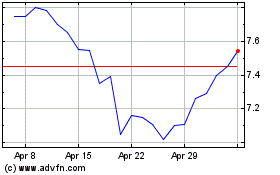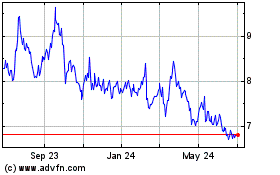Ghosn's U.S. Push Stressed Nissan -- WSJ
December 19 2018 - 3:02AM
Dow Jones News
By William Boston
This article is being republished as part of our daily
reproduction of WSJ.com articles that also appeared in the U.S.
print edition of The Wall Street Journal (December 19, 2018).
Carlos Ghosn's drive to increase Nissan Motor Co.'s share of the
U.S. market added to tension with the auto maker's management, who
felt his push came at the expense of investing in Japan.
Strains to the alliance of Renault SA, Nissan and Mitsubishi
Motors Corp., were apparent well before its creator's arrest last
month. But the extent to which Mr. Ghosn's U.S. plans contributed
to the alienation of Nissan executives has become clearer since his
detention.
Hiroto Saikawa, who began shifting Nissan's strategy after
succeeding Mr. Ghosn as the Japanese company's CEO in 2017, has
opened up about the rift.
"The investment in the Japanese market was very weak because
there was too much power concentrated in one individual who decided
that the Japanese market was less important, and we spent too much
money on the U.S.," Mr. Saikawa said, according to the transcript
of a general meeting at Nissan's headquarters in Yokohama, Japan,
on Nov. 26, days after Mr. Ghosn's arrest.
"He felt that there was no point investing in Japan where the
population was stagnating," Mr. Saikawa told employees, committing
himself to correcting what he described as Mr. Ghosn's
mistakes.
Mr. Ghosn, who continued as Nissan's chairman until his ouster
last month, was charged by Japanese authorities with understating
his compensation and remains in detention in Japan. A person
familiar Mr. Ghosn's defense said the executive maintains his
innocence.
Mr. Ghosn led Renault's investment in Nissan in 1999 and the
effort to revive Japan's second-largest auto maker by sales.
Underlying his strategy was a plan adopted in 2011 called Power 88,
which aimed to boost Nissan's global market share to 8% by 2017 and
its profit margins to 8%, according to a company presentation at
the time.
To lift Nissan's global business, Mr. Ghosn pushed especially
hard in the U.S., setting a market-share target of 10% by 2017,
according to public statements by him and Nissan U.S. executives.
To boost sales there, Nissan put pressure on dealers with a
campaign under the slogan "Grow or Go," led by José Muñoz, whom Mr.
Ghosn appointed to run the U.S. business.
With the appointment, Nissan became more aggressive than its
competitors, according to dealers. Mr. Muñoz prodded them to sell
their franchise if they weren't up to hitting the campaign targets,
according to dealers and comments by Mr. Muñoz in videos available
on YouTube.
"If a dealer didn't perform, they'd threaten a dealer with
termination notice," said Alan Haig, president of Haig Partners, a
Fort Lauderdale, Fla.-based brokerage that arranges sales and
purchases of car dealerships.
A spokesman for Nissan said, "Nissan values the close
relationship with our dealers to grow our business." The auto maker
didn't make Mr. Muñoz available for an interview and he didn't
respond to requests for comment.
Nissan did boost its U.S. sales volume. Last year, Nissan moved
1.6 million vehicles, good for 9.2% of the market and up 75% from
the company's U.S. tally for 2010. Growth was fueled by incentives
as well as sales to rental car operators. Fleet operators buy cars
in large volumes, but they tend to be less profitable than retail
sales, according to industry analysts.
In its fiscal year ended March 30, Nissan reported a record net
profit, thanks in large part to the U.S. corporate tax cut. But
operating profit, which is closely watched by analysts as it
excludes one-time financial gains or other windfalls, fell 23% to
Yen575 billion ($5.11 billion). The result was a profit margin of
4.8%, well below Mr. Ghosn's target.
Mr. Saikawa, who was chief competitive officer at Nissan before
becoming CEO, disagreed with Mr. Ghosn's strategy to boost sales
and believed the sharp focus on U.S. growth came at the expense of
investment in Japan, according to a document reviewed by The Wall
Street Journal. In addition, accusations circulating within Nissan
about Mr. Ghosn's hidden pay and lavish spending at the company's
expense were mixing with deep discontent over his long reign over
the auto maker.
The relationship between the two men grew tense, and Mr. Ghosn
was preparing to oust Mr. Saikawa before his arrest, as previously
reported in The Wall Street Journal.
Sean McLain contributed to this article.
Write to William Boston at william.boston@wsj.com
(END) Dow Jones Newswires
December 19, 2018 02:47 ET (07:47 GMT)
Copyright (c) 2018 Dow Jones & Company, Inc.
Nissan Motor (PK) (USOTC:NSANY)
Historical Stock Chart
From Jun 2024 to Jul 2024

Nissan Motor (PK) (USOTC:NSANY)
Historical Stock Chart
From Jul 2023 to Jul 2024
